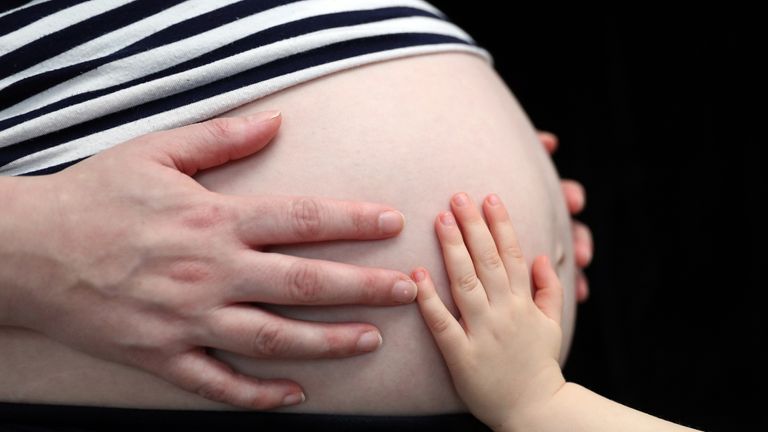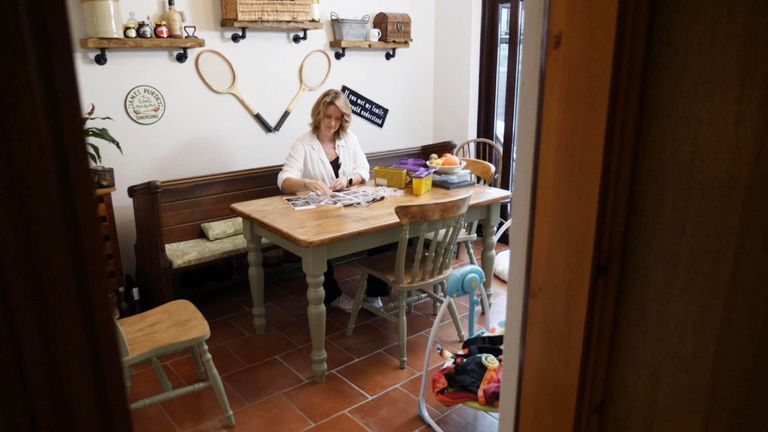Nicole Collarbone never thought she would be a single mother, but as she neared her 40th birthday, she knew she no longer wanted to wait to meet a partner to have a baby.
She decided to have IVF with a sperm donor, but with the steep price of fertility treatment, and no one to share the costs with, Nicole hoped she could get at least part of it on the NHS.
But she was told that because she was single, she didn’t qualify for any fertility treatment on the health service.
“I was gutted,” she said. “It was just such a definitive no. And I had expected maybe something, you know, that we’d explore it a little bit more. There’d be more explanation around the funding, but it was just a no.”
Nicole borrowed money from her family and is now pregnant with her first child.
“I was so dependent on them being able to contribute that if they couldn’t, then I wouldn’t have been able to go down this route.”
She is among a rising number of single women choosing solo motherhood, with a 44% increase in women with no partner doing IVF between 2019 and 2021 according to the Human Fertilisation and Embryology Authority.
But those who cannot afford private treatment have to tackle barriers in the health service which, according to one legal expert, discriminate against them.
Over half of NHS England integrated care boards, which decide on who can get fertility treatment locally, don’t include single women in IVF policies at all.
The rest require them to spend thousands of pounds to prove infertility, by paying privately for between three and 12 cycles of artificial insemination.
It is a less invasive fertility treatment that is about a third as effective as IVF, where a cycle costs between £700 and £1,600.
If that fails, a single woman can be considered for IVF on the NHS.
Read more:
Fertility treatment ‘add-ons’ to be graded by watchdog
Fertility treatments on the up, but not via NHS
In comparison, heterosexual couples are asked if they have been trying to conceive for two years.
Female same sex couples also have to prove infertility, but the government has committed to fund artificial insemination for them as part of the Women’s Health Strategy, created in part to level up access to IVF.
There’s no such commitment for single women though, who will still have to pay, creating an unlevel playing field according Atina Krajewska, professor in human rights law at Birmingham University.
“In my view, single women should be treated similarly to same sex couples, because inevitably they are in a similar situation when it comes to their ability to conceive,” she said.
“I would see this as a discriminatory treatment based on international human rights provisions.
“Those who can afford private treatment will be affected, but not to the same extent, eventually they might just decide that they want to self-fund the treatment and then try to get access to IVF.
“For women who are from more economically disadvantaged backgrounds, this is impossible. It’s a question of equity.”
For Georgie, the issue wasn’t just the cost, but also the time it would take to do six rounds of artificial insemination in order to qualify for just one round of IVF on the NHS in her area.
She was 38 when she decided to try for a baby alone, so she spent much of her savings to go straight to the most effective treatment.
“It is quite daunting in many ways to find out how much I ended up spending but in total with six rounds of IVF I spent in the region of £40,000.
“If you’d told me that at the start, I mean who knows what I would have actually said, but I think there’s a big part of me that would have said that there’s no way I can find that sort of money. I don’t see how I can start this journey.”
Her treatment worked and she recently gave birth to a daughter, though the spiralling cost nearly made her give up.
She considered adoption but her desire to carry and give birth to a baby was overwhelming.
Campaigners acknowledge that NHS finances are under pressure, but say single women are a fraction of those doing IVF, totalling just over 2,800 in 2021 according to the Human Fertilisation and Embryology Authority, so funding them wouldn’t break the bank.
“Single women who want to become parents and haven’t got any other options but to seek help from fertility services, are as deserving of help as anybody else,” said Dr Catherine Hill, CEO of Fertility Network UK.
“If you’re funding six or 12 cycles (of artificial insemination) you’re talking about thousands and thousands of pounds.
“And that’s just financially crippling, it’s a massive financial hurdle. That means it’s practically impossible for most single women to access NHS fertility treatment.”
In exceptional cases the NHS can refer single women to IVF without artificial insemination.
This is what happened to Jennifer Lon-Ho-Kee, after a long and confusing journey navigating the system.
“From the time when I went to my GP initially, just to get some exploratory tests, it’s actually been eight years to the point of getting IVF, which is a hell of a long time. And it was like pulling teeth at every stage,” she said.
She was initially told she could not get fertility treatment because she was single, but when she asked again a few years later she was put on the waiting list.
Because of delays to appointments, she was nearing the age cut-off for fertility treatment in her area and was given IVF just days before breaching it.
The round did not result in a pregnancy, and Jennifer is now spending thousands on fertility treatment abroad.
The financial strain for single women should not be harder than for couples, according to Mel Johnson, a solo motherhood coach.
“Some people spend all their savings, even go into debt to pay for the treatment, which makes the starting point of becoming a parent challenging from a financial point of view,” she said.
“For me the main thing is it will be equitable with everybody else.”
The government told Sky News that local health services in England follow guidelines from the National Institute for Health and Care Excellence (NICE), and a review of those guidelines is expected to be published in 2024.




